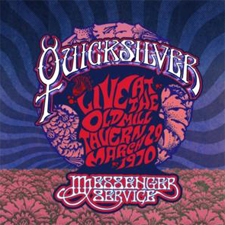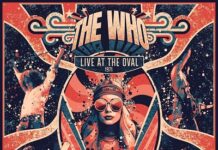Live At The Old Mill Tavern – March 29, 1970 marks another live recording in a steady flow from Quicksilver Messenger Service, pulled from a period when the band was at their high-water mark of musicianship (though they wouldn’t score their “Fresh Air” hit until 1971).
Born out of the mid-60s Northern California patchouli wind, QMS was like so many groups of the era, building their reputation as a live act. “Live shows were our bread and butter,” guitarist and vocalist Gary Duncan claims on this CD’s booklet, and the solid playing is certainly evident from this show played right after the release of their brilliant Shady Grove (there are no songs from that album on this CD).
Though the opener “Subway” is a rangy guitar work-out. a song that wouldn’t appear for another year on a studio recording, by about a third of the way through we hear what was a most important new edition to this band’s sound – the venerable Nicky Hopkins on electric piano. Bo Diddley’s “Mona” is quite strong and a nice display of restraint with Greg Elmore’s conga playing and Hopkins keeping things floating in this very soft and moving tune.
“Baby Bay” is pretty much a mess, a song that singer Dino Valente assures the crowd the band hasn’t ever played until this moment, and it shows. “Rain” just simply takes too long to build up any kind of steam. Its lyrics are truly cringe-worthy. Even Hopkin’s floating trills can’t rescue it. But the band rolls back in with good stead on “Mojo.” This is the kind of fuzzy guitar jam you’d expect from Quicksilver Messenger Service. John Cipollina’s rambling lead guitar is worth its weight gold.
The CD ends with “Blues Jam #1” and “Blues Jam #2,” both featuring the harmonica of James Cotton. Hopkins is in his element here and Elmore’s conga playing makes the first jam really move. The second Jam is even better, as there isn’t too much of the overstaying-its-welcome guitar noodling. We can hear bassist David Freiberg rather well and, of course, there is Hopkins. Live At The Old Mill Tavern – March 29, 1970 is just another reason why Quicksilver Messenger Service stands as one of the shining musical entities to emerge from the Bay Area during the potent psychedelic age of the late 60s and early 70s.
~ Ralph Greco, Jr.




















